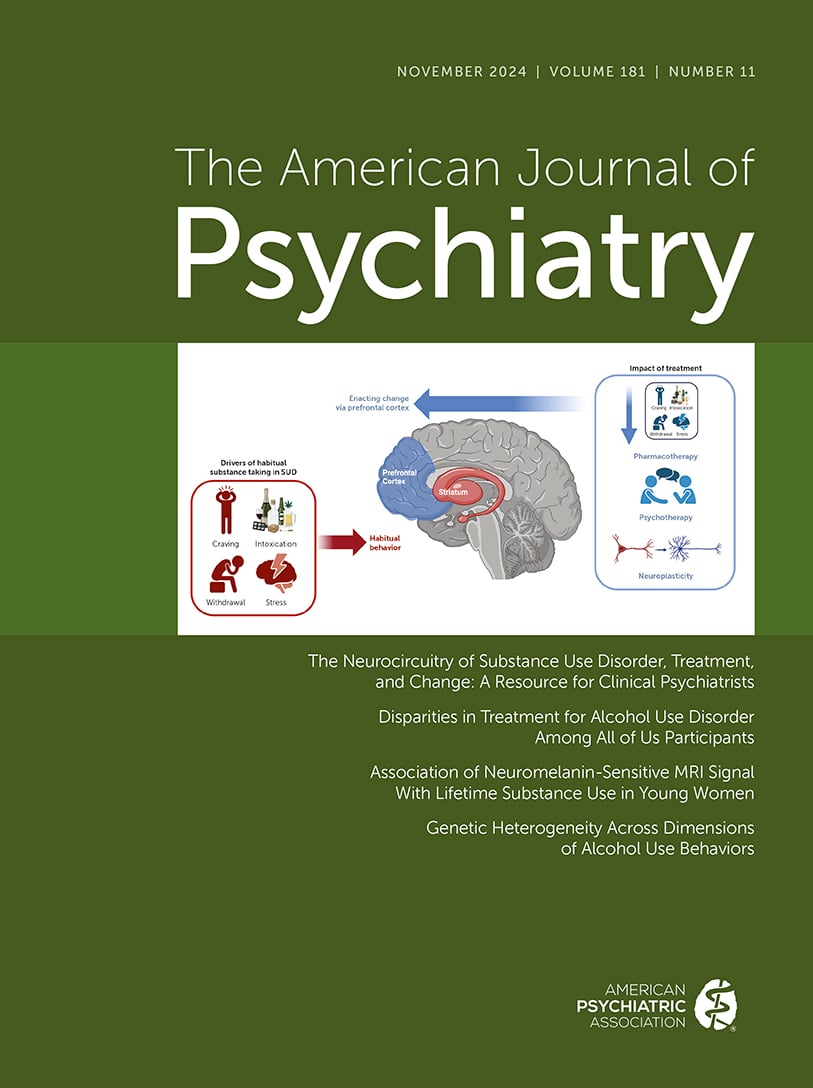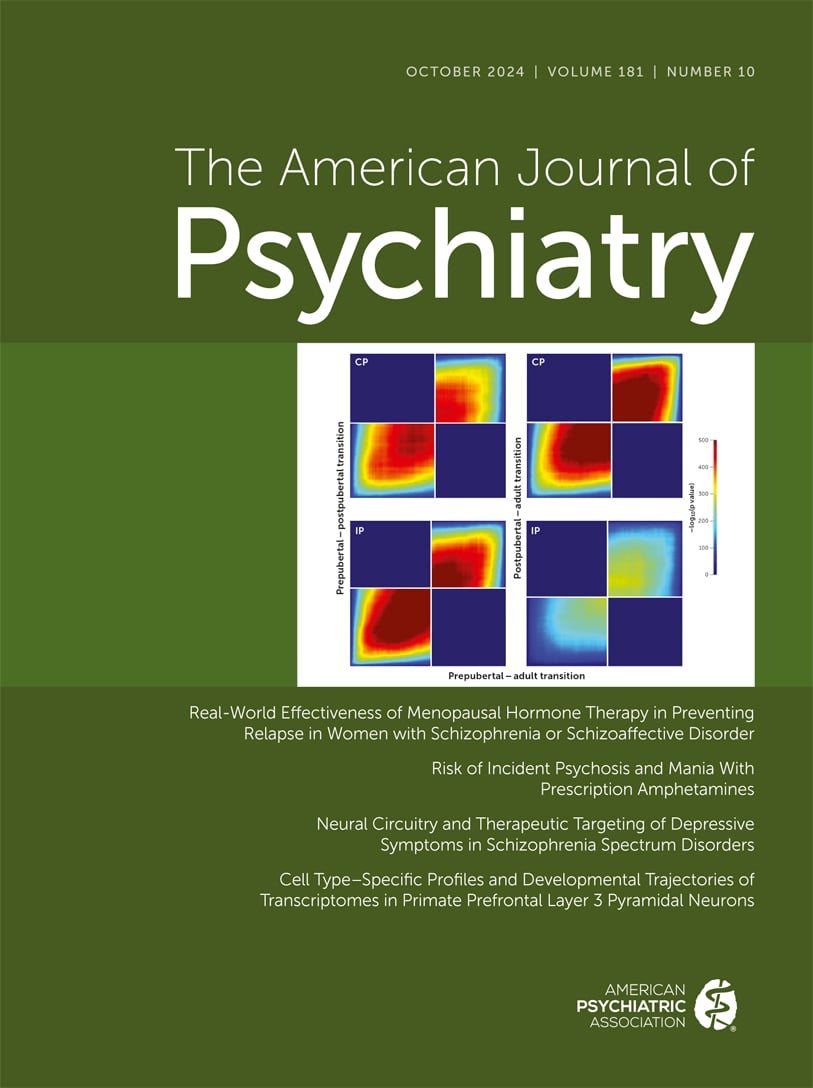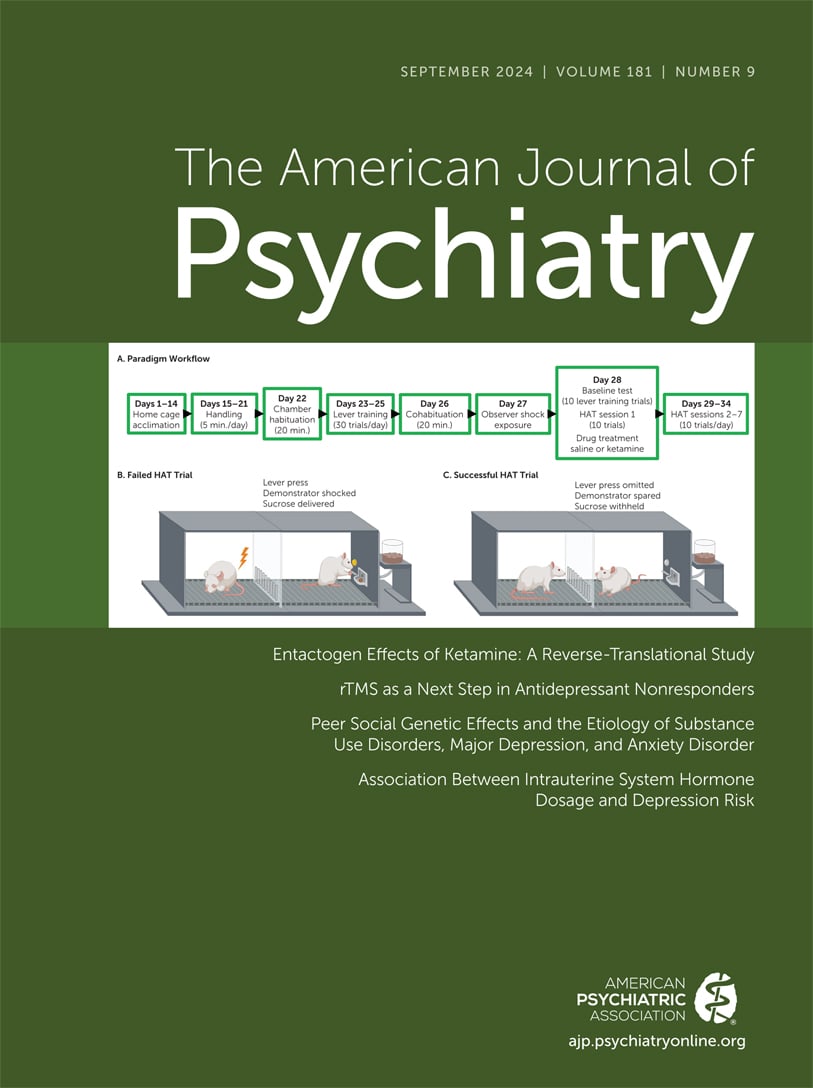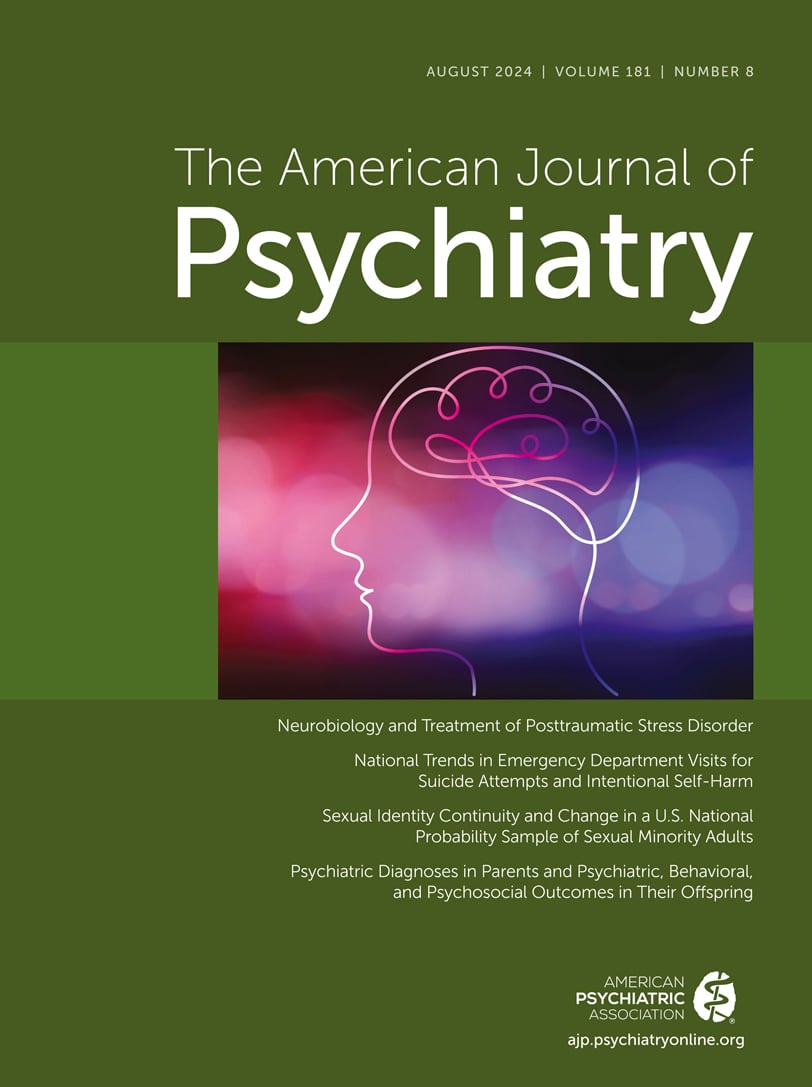American Journal of Psychiatry
- Volume 162
- Number 10
- October 2005
In This Issue
Editorial
Reviews and Overviews
Publication date: 01 October 2005
Pages1785–1804OBJECTIVE: The duration of untreated psychosis may influence response to treatment, reflecting a potentially malleable progressive pathological process. The authors reviewed the literature on the association of duration of untreated psychosis with symptom ...
https://doi.org/10.1176/appi.ajp.162.10.1785Publication date: 01 October 2005
Pages1805–1819OBJECTIVE: Observational studies suggest that long-term lithium treatment has a strong antisuicidal effect in mood disorders, but it is uncertain whether this association is a genuine therapeutic effect or is due to confounding factors in nonrandomized ...
https://doi.org/10.1176/appi.ajp.162.10.1805Introspections
Images in Psychiatry
Article
Publication date: 01 October 2005
Pages1824–1832OBJECTIVE: The purpose of this study was to determine whether a haplotype in the dystrobrevin binding protein 1 (DTNBP1) gene previously associated with schizophrenia not only increases the susceptibility to psychotic illness but also to a more or less ...
https://doi.org/10.1176/appi.ajp.162.10.1824Publication date: 01 October 2005
Pages1833–1839OBJECTIVE: People with schizophrenia have exhibited reduced functional activity in the anterior cingulate cortex during the performance of many types of cognitive tasks and during the commission of errors. According to conflict theory, the anterior ...
https://doi.org/10.1176/appi.ajp.162.10.1833Publication date: 01 October 2005
Pages1840–1848OBJECTIVE: Patients with schizophrenia improve episodic memory accuracy when given organizational strategies through levels-of-processing paradigms. This study tested if improvement is accompanied by normalized frontotemporal function. METHOD: Event-...
https://doi.org/10.1176/appi.ajp.162.10.1840Publication date: 01 October 2005
Pages1849–1858OBJECTIVE: Working memory, a critical cognitive capacity that is affected in schizophrenia, can be divided into maintenance and manipulation processes. Previous behavioral research suggested that manipulation is more affected than maintenance in patients ...
https://doi.org/10.1176/appi.ajp.162.10.1849Publication date: 01 October 2005
Pages1859–1871OBJECTIVE: While both thalamic abnormalities and dopaminergic dysregulation have been separately implicated in the pathophysiology of schizophrenia, little is known about the possible dysfunction of molecules associated with dopaminergic neurotransmission ...
https://doi.org/10.1176/appi.ajp.162.10.1859Publication date: 01 October 2005
Pages1872–1878OBJECTIVE: The anterior cingulate gyrus is a pivotal component of brain networks directing affective and cognitive functions, and abnormalities of the anterior cingulate gyrus may be involved in the pathophysiology of schizophrenia. However, magnetic ...
https://doi.org/10.1176/appi.ajp.162.10.1872Publication date: 01 October 2005
Pages1879–1887OBJECTIVE: The efficacy and safety of olanzapine were compared with those of ziprasidone. METHOD: This was a multicenter randomized, double-blind, parallel-group, 28-week study of patients with schizophrenia. Patients were randomly assigned to treatment ...
https://doi.org/10.1176/appi.ajp.162.10.1879Publication date: 01 October 2005
Pages1888–1895OBJECTIVE: Cognitive impairment is a major determinant of functional outcome in schizophrenia. Treatment of cognitive impairment at the time of the first episode may have the potential to change functional outcomes of the illness. This study examined ...
https://doi.org/10.1176/appi.ajp.162.10.1888Publication date: 01 October 2005
Pages1896–1903Background: Cognitive deficits consistently have been reported in schizophrenia patients and in patients with schizotypal personality disorder. For this study, the authors wanted to identify which of the domains of cognitive impairment represent “core” ...
https://doi.org/10.1176/appi.ajp.162.10.1896Publication date: 01 October 2005
Pages1904–1910OBJECTIVE: Premorbid intellectual impairment has been described in schizophrenia, but little is known about premorbid intellectual functioning in bipolar disorder or other psychoses. In this study, premorbid intellectual ability was investigated in ...
https://doi.org/10.1176/appi.ajp.162.10.1904Publication date: 01 October 2005
Pages1911–1918OBJECTIVE: The largest clinical epidemiological surveys of personality disorders have been based on unstructured clinical evaluations. However, several recent studies have questioned the accuracy and thoroughness of clinical diagnostic interviews; ...
https://doi.org/10.1176/appi.ajp.162.10.1911Publication date: 01 October 2005
Pages1919–1925OBJECTIVE: This study compared three-dimensional representations of DSM-IV personality disorders and standard categories with respect to their associations with psychosocial functioning. METHOD: Six hundred sixty-eight patients with semistructured ...
https://doi.org/10.1176/appi.ajp.162.10.1919Publication date: 01 October 2005
Pages1926–1932OBJECTIVE: The authors investigated 1) whether adolescents and adults in the community diagnosed with personality disorder not otherwise specified are at elevated risk for adverse outcomes, and 2) whether this elevation in risk is comparable with that ...
https://doi.org/10.1176/appi.ajp.162.10.1926Publication date: 01 October 2005
Pages1933–1940OBJECTIVE: Time-limited manualized dynamic psychotherapy was compared with community-delivered psychodynamic therapy for outpatients with personality disorders. METHOD: In a stratified randomized clinical trial, 156 patients with any personality disorder ...
https://doi.org/10.1176/appi.ajp.162.10.1933Publication date: 01 October 2005
Pages1941–1947OBJECTIVE: The purpose of this study was to quasiprospectively investigate continuities between emotional and disruptive behavior disorders in adolescence and personality disorders in adulthood. METHOD: One hundred thirty subjects (age: mean=43.2 years) ...
https://doi.org/10.1176/appi.ajp.162.10.1941Publication date: 01 October 2005
Pages1948–1956OBJECTIVE: Although large-scale surveys indicate that patients with severe mental illness want to work, their unemployment rate is three to five times that of the general adult population. This multisite, randomized implementation effectiveness trial ...
https://doi.org/10.1176/appi.ajp.162.10.1948Publication date: 01 October 2005
Pages1957–1960OBJECTIVE: Financial conflict of interest has been reported to be prevalent in clinical trials in general medicine and associated with a greater likelihood of reporting results favorable to the intervention being studied. The extent and implications of ...
https://doi.org/10.1176/appi.ajp.162.10.1957Brief Report
Publication date: 01 October 2005
Pages1961–1963OBJECTIVE: This study used functional magnetic resonance imaging to investigate amygdala response in patients with acute posttraumatic stress disorder (PTSD) to emotional expressions. METHOD: Thirteen medication-free individuals with acute PTSD and no ...
https://doi.org/10.1176/appi.ajp.162.10.1961Publication date: 01 October 2005
Pages1963–1966OBJECTIVE: Face recognition memory deficits in schizophrenia are attributed to frontotemporal dysfunction. Biological relatives of patients have similar deficits, suggesting genetic susceptibility. Because the impairment may reflect generalized object ...
https://doi.org/10.1176/appi.ajp.162.10.1963Publication date: 01 October 2005
Pages1966–1969OBJECTIVE: Duration of untreated psychosis is associated with time to treatment response among patients with schizophrenia. However, individual psychotic symptoms have not been investigated in this context. The authors examined the relationship between ...
https://doi.org/10.1176/appi.ajp.162.10.1966Publication date: 01 October 2005
Pages1969–1971OBJECTIVE: The authors tested whether decisions about incongruencies in the representation and processing of semantic knowledge, thought to be related to cognitive control, are selectively impaired in schizophrenia. METHOD: Twenty-four patients with ...
https://doi.org/10.1176/appi.ajp.162.10.1969Publication date: 01 October 2005
Pages1972–1974OBJECTIVE: The authors report a large family in which bipolar disorder appears to cosegregate with autosomal-dominant medullary cystic kidney disease. METHOD: Information regarding diagnostic criteria for bipolar disorder and medullary cystic kidney ...
https://doi.org/10.1176/appi.ajp.162.10.1972Publication date: 01 October 2005
Pages1975–1977OBJECTIVE: Patients with bipolar disorder become hyperhedonic when manic and anhedonic when depressed; therefore, it is important to test whether patients with bipolar disorder show deficits on behavioral paradigms exploring reward/punishment mechanisms. ...
https://doi.org/10.1176/appi.ajp.162.10.1975Publication date: 01 October 2005
Pages1977–1979OBJECTIVE: This study attempted to assess whether an index of the difference between the wish to die and the wish to live constitutes a risk factor for suicide. METHOD: A study group of 5,814 patients, including 44 who committed suicide (0.8%), were ...
https://doi.org/10.1176/appi.ajp.162.10.1977Publication date: 01 October 2005
Pages1980–1982OBJECTIVE: The authors’ goal was to characterize cognitive flexibility and verbal learning in relatives of patients with bipolar disorder and in euthymic patients with recurrent major depression. METHOD: The intradimensional/extradimensional shift task ...
https://doi.org/10.1176/appi.ajp.162.10.1980Letter to the Editor
Book Forum: Psychotic Disorders
Book Forum: Public Health Perspectives
Book Forum: Psychotherapies
Book Forum: Behavioral Genetics
Book Forum: Pathological Gambling
Past Issues
View Issues Archive
Vol. 181 | No. 11

Vol. 181 | No. 10

Vol. 181 | No. 9
